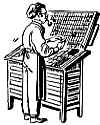|
A Radio Talk by Charles F. Kettering  More than 500 years ago, Gutenberg developed the art of printing,
and to him goes the credit for the first step in the mass-production
idea. And although this idea of "exact duplication" became firmly
established in printing, no one seemed to have thought of applying it
to anything else - that is, until Eli
Whitney came on the scene.
More than 500 years ago, Gutenberg developed the art of printing,
and to him goes the credit for the first step in the mass-production
idea. And although this idea of "exact duplication" became firmly
established in printing, no one seemed to have thought of applying it
to anything else - that is, until Eli
Whitney came on the scene. Every American knows the story of Whitney's invention of the cotton gin and what that has meant to the textile industry. Very few, however, are as familiar with his later development. It came about this way: In 1798, our government was in great need of rifles, It was then that Eli Whitney suggested the idea that has completely changed American industry. He offered to make 10,000 rifles for the government in two years - an amount which seems small to us now when we can produce that many in a day. But at that time production in such volume was unprecedented. |








